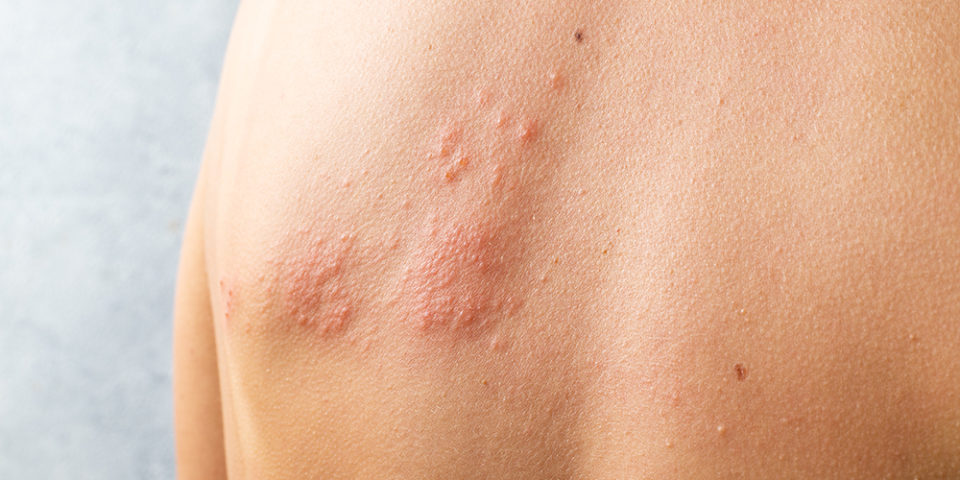Shingles: What you need to know
Shingles is a viral infection caused by the varicella virus – the same virus that causes chickenpox. While chickenpox used to be a nearly universal part of childhood and is now vaccinated against during infancy and the toddler years, shingles is still a potential result of any varicella infection.
Can you do anything to prevent the onset of shingles if you’ve had chickenpox? Ashley Dean, MD, explained what you need to know about this common viral infection.
Are chickenpox and shingles the same thing?
“Although shingles and chickenpox are caused by the same virus, they are not the same disease,” said Dr. Dean.
When initially infected by the varicella virus, an individual will come down with chickenpox. While chickenpox is generally mild, it leaves behind the varicella virus, which lies dormant, or inactive, within the body. This also happens with those who receive the varicella vaccine later in life, but it isn’t common with those who receive the vaccine in childhood.
When the virus becomes active again, it causes a similar but distinct disease, shingles.
Some people are more prone to shingles than others, including:
- Those with a history of chickenpox infection
- Individuals who received a varicella vaccination at a later age than is recommended
- Immunocompromised individuals, whose immune systems have been weakened by a medical condition or certain medications
- Adults aged 60 and older
What are the most common symptoms of shingles?
“What most people come to their doctor about initially is a painful rash,” said Dr. Dean.
Before the rash appears, people infected with shingles may experience pain, itching or tingling in the area where the rash will develop. Usually, the rash will show up somewhere along the side, upper back or torso, but it can also appear on one side of the face.
The rash creates painful blisters which scab over within 7–10 days, but it could take a month or even more for symptoms to completely resolve.
Other symptoms associated with shingles include:
- Fever
- Chills
- Headache
- Upset stomach
- Vision changes or loss (if rash appears on the face or close to the eyes)
- Rarely, hearing loss
How is shingles treated?
“We usually turn to antiviral medications to treat varicella infections,” said Dr. Dean. “Acyclovir, valacyclovir and famciclovir are the most effective when given within 72 hours of the rash’s appearance.”
Shingles rashes are self-limited, meaning they don’t spread, and they can resolve without any intervention. In some cases, shingles can be treated at home with over-the-counter pain and inflammation relievers like acetaminophen (Tylenol), ibuprofen or another NSAID or topical lotions like calamine to ease the discomfort and itching.
It’s rare for a shingles infection to become severe, but it can happen. Speak with your doctor right away if you notice the beginning of the telltale blisters and rash so that you can be prescribed medicine to help you recover more quickly.
Is shingles contagious like chickenpox?
“Shingles isn’t even remotely as contagious as chickenpox,” said Dr. Dean, “But spreading the virus is possible when the rash is in the blister phase and hasn’t started scabbing over yet.”
You can prevent the spread of shingles by keeping the rash covered, avoiding touching or scratching at it, washing your hands frequently and avoiding physical contact with others until the rash has crusted over.
Is there a vaccine for shingles?
You can receive a vaccination to prevent shingles, called Shingrix. Two doses are given 2–6 months apart. It’s recommended by the CDC for those 50 and older and those with compromised immune systems who are 19 or older, even if you’ve already had the chickenpox infection or chickenpox vaccine in the past.
If you’ve had shingles, Shingrix can prevent future flare-ups. Just make sure the shingles rash has gone away before getting vaccinated.
If you received the Zostavax shingles vaccine, which is no longer offered in the U.S., a Shingrix vaccine is still recommended.
Talk with your doctor to learn more.
Find the care you need, close to home
Our primary care physicians provide well visits and everyday care when you need it with compassion and expertise.
Find Primary Care Near You

